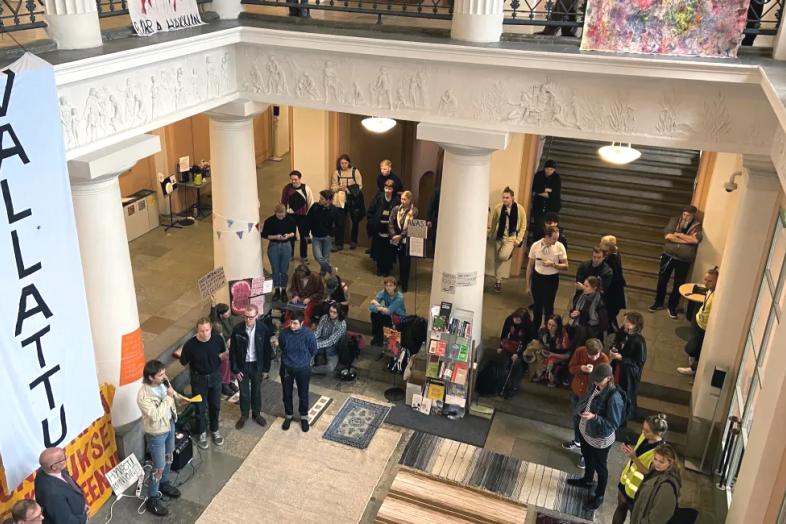Protests put spotlight on University’s role

The demonstrations in the autumn and early winter have led to the clarification of various University principles for political statements, collaboration and facility use.
Last autumn and early winter were a time of high-profile civic activism at the University and in its facilities. The student sit-in in the Main Building against the actions of the Finnish government lasted almost three weeks, and other shorter protests were held at various campuses. November saw the beginning of pro-Palestinian demonstrations.
All the above protestors have called on the University or its leadership to step forward and take a stand on the issues in question. The call was heeded during the student protest earlier in the autumn since the topic of studying and its prerequisites are a matter for the University community as a whole.
Lobbying behind the scenes and through separate channels
The University is a community of multiple voices. It is not a political actor nor does it wish to be drawn into disputes. The University conducts advocacy work and lobbies decision-makers to protect its interests, particularly in times of financial crisis.
These efforts do not necessarily attract media attention or capture the interest of the public. The University communicates with policy-makers and political parties, safeguards its interests in elections, and issues statements. In addition, the University chancellor has the right to be present and speak at government sessions. University researchers offer information to increase public understanding of crises and, at best, help find solutions.
When the University takes a public stand, it does so on its own initiative and in accordance with its own principles. For example, on 22 November, the University stated its position on the situation in Gaza.
“We condemn all violence and war crimes and hope that the conditions of universities and higher education institutions in the conflict zone can be protected. We join the many voices calling for the cycle of human suffering in the Middle East to be brought to an end,” stated Rector Sari Lindblom.
As for the conditions necessary for studying, the University has issued its own statements and signed the one drafted by Universities Finland (Unifi).
No automatic termination of collaboration in crisis situations
Some have asked why the University terminated its collaboration with Russian universities and projects after Russia invaded Ukraine in 2022, but has not done the same with Israel or the Palestinians.
The severing of ties with Russia was based on joint decisions by the EU member states and on the Ministry of Education and Culture instructions to withdraw from institutional cooperation with Russian universities. No similar decisions or instructions have been issued on the situation in Gaza. Student exchange with countries engaged in war has of course been suspended.
The University as a safe space for everyone
The University is committed to its values in both external and internal operations. It seeks to foster a sense of community even in times of crisis. Regardless of their background, all University community members should feel safe when studying or working at the University.
This applies also to demonstrations on University premises. Although open to the public, University facilities cannot be used by just anyone for any purpose at any time.
To ensure the safety of everyone present, each event and session is assessed separately. In addition, University facilities cannot be used during the night without permission, nor can events be organised solely on notification by the organiser.
During the autumn protests, students were exceptionally allowed to spend the night in the Main Building, although an overnight stay there is not usually permitted. The night-time use of facilities has subsequently been prohibited, as the first three-week sit-in was draining for the staff who had to be on call day and night.
Thoughts, comments, questions? Discuss this news item on Flamma.
Photo: Hannamaija Helander